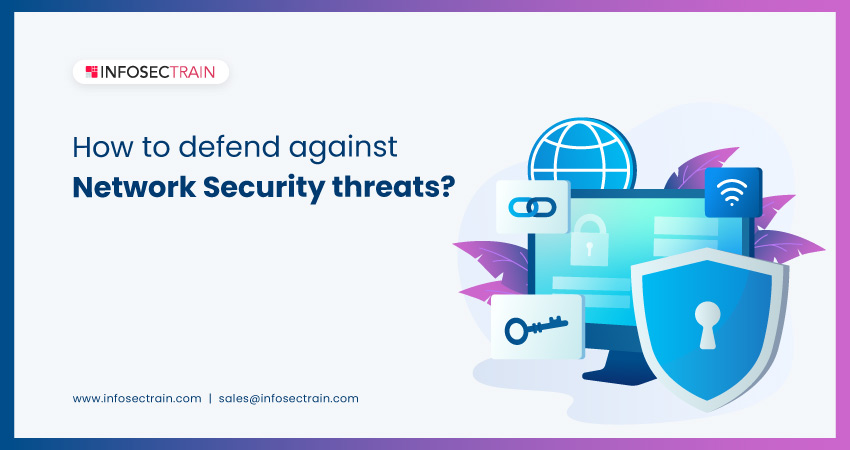How to Defend Against Network Security Threats?
Every day, the usage and availability of the internet is growing, and with that, the security dangers that affect our systems and networks grow as well. Cyber-attacks have become the most hazardous for firms, as they infiltrate and steal sensitive data such as organizational assets, financial information, etc. Criminals are constantly looking for new ways to cause harm to systems and networks. We should be aware of network security and the methods we use to secure our data and infrastructure.

In this article, we will look at what Network Threats are, how to defend against Network Security Threats, and the consequences of Network Breaches.
Table of Contents
What are Network Security Threats?
How to protect Network Security?
Consequences of Network Breaches
What are Network Security Threats?
Network Security Threats are attacks that can compromise our systems or networks by gaining unauthorized access to data and stealing sensitive information. There are various types of Network Security Threats that might target an organization’s system to achieve specific objectives.
1. Phishing: Phishing emails, email attachments or text messages are used to attack a system or network to obtain sensitive information from the victim, such as account information, personal information, etc.
2. DDoS (Distributed Denial of Service): It is one of the most dangerous Network Security attacks. An attacker sends numerous requests to your server, increasing bandwidth and rendering it unavailable to legitimate users.
3. Ransomware: Ransomware is a harmful application used by hackers to encrypt files and documents, restrict access to your machine, and demand a ransom payment in exchange for access to your system.
4. Malware: Malware is malicious software that can disrupt and harm computers and networks of systems; it can be ransomware, trojans, spyware, viruses, worms, etc.
How to protect Network Security?
Defending against network-related risks can be done in several ways. The following are a few of the most effective strategies:
1. Install Antivirus software: Antivirus software is the first line of defense against malicious software. It safeguards your computer from malware attacks that could harm your operating system. It protects your data by detecting real-time threats, preventing destructive files from being installed on a machine, and improving email security. We should update the antivirus on a regular basis; some antivirus programs are updated automatically.
2. Install Anti-spyware software: Anti-spyware software is a tool that detects and removes undesirable spyware installed on your computer. It safeguards your privacy against dangerous malware.
3. Keep your software up-to-date: Hackers are aware of flaws in older versions of software that can be used to harm your computer system, and these flaws constitute the hackers’ entry point. So, keep your software up to date, and apply new updates as needed. Updated software versions iron out security issues and fix security vulnerabilities.
4. Use complex passwords: The most critical approach for network security is to use strong passwords. With more secure passwords, your data and system will be safe from illegal access. Your password should be eight characters long and include uppercase, lowercase, symbols, and numbers. Don’t use your date of birth or phone number.
5. Use Firewall: A firewall is an essential tool for protecting Network Security from intrusions. A firewall filters network traffic and blocks harmful traffic requests by setting a barrier between information and the outside world, and it aids in the prevention of unauthorized network access.
6. Implement security policies: Apply security policies to decrease the danger of unauthorized network access. Security policies increase productivity by encouraging accountability and discipline. It protects devices connected to a network against harmful malware.
7. Train employees: Train your personnel on Network Security to protect your network and infrastructure. Employees should be aware of all hazards or cyber risks. Your employees should be familiar with network security and be able to spot risks right away. Because security dangers are increasing every day, provide security training throughout the year. Ask employees to use secure passwords and never share company information with anyone outside the company.
8. Keep an eye on the activities: Lastly, it’s crucial to keep track of your organization’s network activities on a daily basis because attackers can strike your devices at any time. Check for potential risks regularly, and use tracking logs and other tools to spot suspicious activities rapidly.
Consequences of Network Breaches
1. Data Loss: Network Security breaches cause data loss in an organization. The organization may lose critical information such as financial records, assets, customer personal information, passwords, and so on due to the data breach.
2. Loss of revenue: Because of the Network Security issue, some businesses get relocated to another place, due to which they face a massive loss in revenue.
3. Damage reputation: When a firm is attacked, its reputation is severely ruined, making it difficult for customers and stakeholders to trust the organization again.
4. Increased Cost: To protect from security breaches, companies upgrade security systems and hire additional skilled professionals to limit the risk, which increases costs.
Network Security with InfosecTrain
If you want to learn more about Network Security, InfosecTrain is a good place to start. With years of expertise, InfosecTrain is a leader in the IT Security and Cyber Security training market. They provide a Network Security certification training course, which includes all you need to know about Network Security, from the fundamentals to advanced tactics. Enroll in this course to learn about Network Security’s tremendous potential and opportunities.




 1800-843-7890 (India)
1800-843-7890 (India) 
